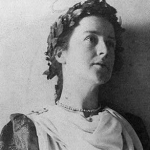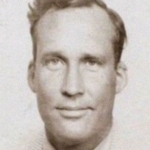Compassionate eyes had our brave John Brown,
And a craggy stern forehead, a militant frown;
He, the storm-bow of peace. Give him volley on volley,
The fool who redeemed us once of our folly,
And the smiter that healed us, our right John Brown!
Too vehement, verily, was John Brown!
For waiting is statesmanlike; his the renown
Of the holy rash arm, the equipper and starter
Of freedmen; aye, call him fanatic and martyr:
He can carry both halos, our plain John Brown.
A scandalous stumbling-block was John Brown,
And a jeer; but ah! soon from the terrified town,
In his bleeding track made over hilltop and hollow,
Wise armies and councils were eager to follow,
And the children’s lips chanted our lost John Brown.
Star-led for us, stumbled and groped John Brown,
Star-led, in the awful morasses to drown;
And the trumpet that rang for a nation’s upheaval,
From the thought that was just, thro’ the deed that was evil,
Was blown with the breath of this dumb John Brown!
Bared heads and a pledge unto mad John Brown!
Now the curse is allayed, now the dragon is down,
Now we see, clear enough, looking back at the onset,
Christianity’s flood-tide and Chivalry’s sunset
In the old broken heart of our hanged John Brown!





















Comment form: